I really wanted to wrap up this topic in two parts, but I’ve got so fascinated by it that I can’t seem to get stopped. So:
In Part One last week, we looked at the facts regarding the overall decline of American Christianity.
Part Two today will cover the topics shown above, but this will be my personal account: What I have seen and experienced in my 82 years, and my attempt to explain it.
In Part Three next week we’ll look at: 1 The Rise of the “Nones”, and possible causes for that. 2 The state of Orthodoxy in America in the midst of all this chaos.
And that will be the conclusion. Promise.
However… if you want a more thorough popular analysis of the history of Protestantism and how the present messy state of things came to be, go to “Ancient Faith Blogs Father Bill Post 72” and then “73”, “74”, “75”.
The Glory Days of the Mainline Protestants and Roman Catholics
In the 1940s and 1950s, “mainline” Protestantism (Methodists, Presbyterians, Episcopalians, Baptists, and the like) was dominant in America. Christian songs were sung in public schools. At Christmas, carols about the birth of Jesus were on the radio – and in the stores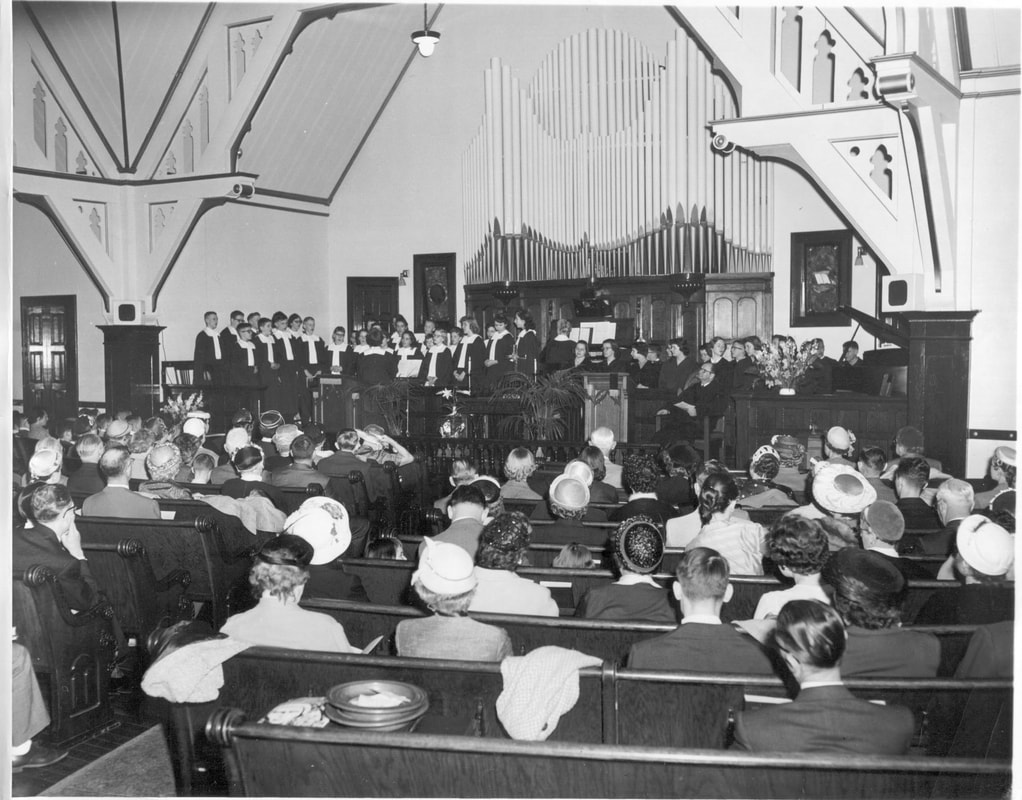 , being used to sell merchandise! At the public school in the Ohio village where I grew up, the County Bible Teacher visited us weekly, and on Good Friday everybody tramped two blocks up to the nearest Protestant church to attend services! (When a “Catholic” family moved into town, their kids were excused but only if they went to their church one town north.) It seemed like everybody went to church on Sunday. Into the 1960s “mainline” churches were still being built or expanded, especially to cope with all the Sunday Schoolers.
, being used to sell merchandise! At the public school in the Ohio village where I grew up, the County Bible Teacher visited us weekly, and on Good Friday everybody tramped two blocks up to the nearest Protestant church to attend services! (When a “Catholic” family moved into town, their kids were excused but only if they went to their church one town north.) It seemed like everybody went to church on Sunday. Into the 1960s “mainline” churches were still being built or expanded, especially to cope with all the Sunday Schoolers.
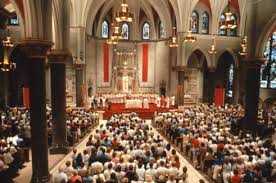 Roman Catholicism was also booming and in their own way part of popular American culture. (Sometime watch Bing Crosby playing a “Catholic” priest in the charming movie “The Bells of Saint Mary’s”.) Many of their churches advertised multiple Sunday Masses. Parking lots
Roman Catholicism was also booming and in their own way part of popular American culture. (Sometime watch Bing Crosby playing a “Catholic” priest in the charming movie “The Bells of Saint Mary’s”.) Many of their churches advertised multiple Sunday Masses. Parking lots 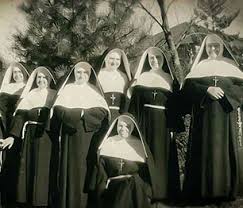 overflowed. There were many black-robed nuns, large rectories and often several priests per parish.
overflowed. There were many black-robed nuns, large rectories and often several priests per parish.
There was also an odd secularized Christianity. For example my favorite old time comedian Jack Benny was Jewish, but on his show he celebrated “Christmas” and “Easter” just like everybody else.
At least where I grew up, independent fundamentalist Bible churches were a small minority. (Was it different in the South?) But in the Methodist and Episcopalian seminaries where I studied, they were dismissed as a dying breed. Who in this modern world could accept this kind of unthinking religion?
In the 1950s and 1960s “organized religion” as a whole was still the most trusted institution in America.
Why the Fall of the “Mainlines” and Roman Catholics?
I will now try to offend everyone impartially. I will also overgeneralize. There were and are many exceptions to what follows. Keep in mind that in all these churches there have been many good people who are sincerely seeking God, love Jesus, and do many good works. We must especially admire those who do so under difficult circumstances.
I do think my multi-faceted experience gives me some ability to speak here. (This is almost embarrassing to tell you.) I was raised in a “Bible church” (though with “mainline” denominational connections), then became not a skeptic about God but I guess you’d call it a theological liberal for a while. Then I attended a seminary which offered both modern Protestant liberalism and traditional creedal Methodism, take your choice. I chose the Creed. After that I joined an Anglo-Catholic 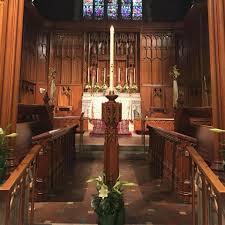 parish which was trying hard to be traditional Roman Catholic. Right Then I studied in a mainline Episcopalian seminary, and finally settled for 21 years in a standard high church Episcopalian parish – only to watch the Episcopal Church being conquered by liberal Protestantism. There isn’t much I haven’t been through.
parish which was trying hard to be traditional Roman Catholic. Right Then I studied in a mainline Episcopalian seminary, and finally settled for 21 years in a standard high church Episcopalian parish – only to watch the Episcopal Church being conquered by liberal Protestantism. There isn’t much I haven’t been through.
Now I’m home, thank God and Saint Nicholas. I’ve been Orthodox for 31 years.
So here we go:
1 On the whole, formerly “Mainline Protestantism” has abandoned their Scriptural (and Traditional) roots, “sold their inheritance for a mess of pottage” as the KJV put it. (Read Genesis 25:29–34.) Or at least they have compromised and made room for false teachings. As early as the mid ’60s, an official Episcopalian commission declared that the term “heresy” no longer applied in today’s world!
Teachings, both doctrinal and moral, have been altered. Even within their own denominations, people can now go parish to parish, pastor to pastor, and find huge differences, almost different religions. Forgive me for picking on the Episcopal Church, but it’s what I knew.  A friend of mine once went to Trinity Church, Wall Street, for their weekday Noon Mass. A visiting Bishop, vested in traditional regalia, presided and preached that the doctrine of the Holy Trinity is a piece of junk and has got to go. Then he proceeded to celebrate Mass and at the end he blessed everyone with the sign of the Cross “In the name of the Father and of the Son and of the Holy Ghost” and departed. Did the local Bishop step on him? No. He sort of agreed.
A friend of mine once went to Trinity Church, Wall Street, for their weekday Noon Mass. A visiting Bishop, vested in traditional regalia, presided and preached that the doctrine of the Holy Trinity is a piece of junk and has got to go. Then he proceeded to celebrate Mass and at the end he blessed everyone with the sign of the Cross “In the name of the Father and of the Son and of the Holy Ghost” and departed. Did the local Bishop step on him? No. He sort of agreed.
When I was Episcopalian, the rector of a nearby parish told me one day that he still had people in his church who actually “believe that Jesus is God“! Yet he said the Creed every Sunday. I asked a friend one time how he could recite “who was born of the Virgin Mary” when he didn’t believe it. He replied that he believed in a “spiritual Virgin Birth”. Object lessons on how to disorient your people.
Forms of worship likewise were changed, sometimes radically – often for good reason, to try to recover early Church Tradition – but it threw ordinary folks for a loop. Abortion, female clergy, homosexuality and sexually active gay clergy which had always been “wrong” suddenly were “right”. Many “Mainline” leaders, abandoning the Gospel, turned to left wing social and political ideology. I mean, if this is what people want, why go to church? It’s a lot easier to stay home and watch MSNBC. Or go somewhere else, as many did. Oh, I should also mention that the low birthrate among “Mainline” people has also contributed to the decline.
2 The Roman Catholic Church appears to have gone the same way. Doctrine officially remains unaltered, though in practice it is sometimes hard to tell that. Much else has definitely changed. Eating meat on Friday, once a mortal sin which could send a person to hell, overnight became no big deal. The Mass has changed radically and lost its old sense of mystery. Confession is no longer mandatory: one Priest alone in a large parish couldn’t possibly handle it.
First let me say that over the years I have attended a number of Roman Catholic services that were respectably done, though I fear rather dull. And I hope to God the following were “beyond the fringe” and are now under control. However, without seeking them out, I have also attended two RC Rock Masses. In one the refrain to the only “religious” hymn was “For God, love, rock and roll!“. The other featured an offertory procession consisting of a corporate snake dance carrying raisin bread to the altar for consecration. And a “comedy club” wedding where the priest interspersed the ceremony with jokes, some rather tasteless, and 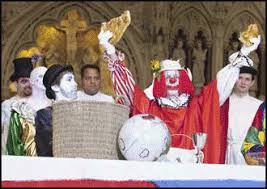 non-Catholics stood around the altar and helped consecrate (?) the bread and wine. I discovered a “clown Mass”. And a group of Milwaukee nuns who worshiped “Wicca”, the mother goddess. And I heard a “Catholic” priest publicly deny the divinity of Jesus.
non-Catholics stood around the altar and helped consecrate (?) the bread and wine. I discovered a “clown Mass”. And a group of Milwaukee nuns who worshiped “Wicca”, the mother goddess. And I heard a “Catholic” priest publicly deny the divinity of Jesus.
But what is for most people the biggest issue: the abuse of children by too many clergy, tolerated and covered up by too many bishops, and too many dioceses going to civil court to avoid compensating the victims, till finally the law got them and they’ve declared bankruptcy.
Do we wonder why the Roman Catholic Church in America is rapidly declining? A former member once told me that the single largest religious group in America today are “lapsed Catholics”!
The Rise of the Evangelicals
But not everybody has declined.
Just for clarity(?), let me explain (pay attention closely now, class) that sixty years ago most mainline Protestants were still Evangelicals in the Reformation tradition. Some more conservative Protestants (like traditional Lutherans) still call themselves Evangelicals. However now, as we said, most “Mainline Protestants” are theological liberals. Today some (but not all) of the “Bible churches” call themselves Evangelicals, though in popular parlance all of them are referred to as “Evangelicals”, and here I’ll use the term that way. However, traditional Evangelicals had denominational connections and oversight. Most modern independent ones do not. Does that make it come clear? I didn’t think so.
Why have “Evangelicals” done so well in recent years?
Simple. They have been picking up pieces left over from “Mainlines” and Roman Catholics. I know people who have left 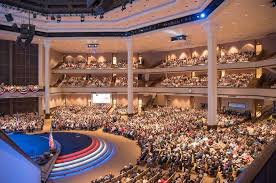 and gone to fundamentalist churches just so they can hear about Jesus, and to find something solid to live by. “Evangelicals” are now situated where the “Mainlines” and Roman Catholics were sixty years ago.
and gone to fundamentalist churches just so they can hear about Jesus, and to find something solid to live by. “Evangelicals” are now situated where the “Mainlines” and Roman Catholics were sixty years ago.
And we know what’s happened to them. Few things in the modern Protestant world last for long.
Before we go further, let me add a disclaimer. When I lost faith in Anglicanism and didn’t know what ever to do, I briefly gave modern Evangelicalism a serious look, because I dearly love the Scriptures, as do they. I did not like much of what I saw and still don’t.
I think today’s Evangelicals have some big problems.
1 Instability. Nothing is solid – the result of their “Bible alone” doctrine. What is the correct interpretation of the Bible? It’s a free for all. Which is why there are now a gazillion Protestant churches, each with the “true” Bible teaching. How can a person know which one is the right one? How do I choose? Luther discovered this to his horror. Modern Evangelicals and fundamenalists are now catching on to this.
Here from Pew Research is a list of today’s Bible church “Evangelical” groups in America Some have broken away from traditional denominations to form their own denominations. Others just hang there by themselves. And I’m sure many are not listed there. I know of some in Milwaukee.
I do not intend you to read all this! Just scroll down and get the picture.
Evangelical Protestant Tradition
Nondenominational in the evangelical tradition
Nondenominational evangelical
Nondenominational fundamentalist
Nondenominational charismatic
Interdenominational (if born again)
Community church (if born again)
Nondenominational Protestant
Nondenominational Christian
Federated or union church (if born again)
Association of Bridge Churches
Ethnic nondenominational (if non-black and born again)
Electronic ministries
Nondenominational, ambiguous affiliation (if non-black and born again)
Nondenominational, not further specified (if non-black and born again)
Lutheran in the evangelical tradition
Lutheran Brethren
Church of the Lutheran Confession
Free Lutheran
Apostolic Lutheran Church in America
Lutheran Congregations in Mission for Christ
North American Lutheran Church
Lutheran Church of the Reformation
Conservative Lutheran
Ethnic Lutheran (if born again)
Lutheran, ambiguous affiliation (if born again)
Lutheran, not further specified (if born again)
Presbyterian in the evangelical tradition
Associate Reformed Presbyterian
Cumberland Presbyterian Church
Orthodox Presbyterian
Evangelical Presbyterian
Reformed Presbyterian
Congregational Presbyterian
Bible Presbyterian Church
Conservative Presbyterian Church
Independent Presbyterian
Covenant Presbyterian Church
ECO: A Covenant Order of Evangelical Presbyterians
Charismatic Presbyterian
Ethnic Presbyterian (if born again)
Presbyterian, ambiguous affiliation (if born again)
Presbyterian, not further specified (if born again)
Pentecostal in the evangelical tradition
Assemblies of God
Church of God (Cleveland, Tenn.)
Four Square Gospel (Four Square)
Pentecostal Church of God
Pentecostal Holiness Church
Church of God of the Apostolic Faith
Assembly of Christian Churches
Church of God of Prophecy
Vineyard Fellowship
Open Bible Standard Churches
Full Gospel (if non-black)
Calvary Chapel
Apostolic Pentecostal (if non-black)
Nondenominational, independent Pentecostal (if non-black)
Missionary Church
Elim Fellowship
International Pentecostal Church of Christ
Evangelical Pentecostal
Church of God of Kentucky
Charismatic (if non-black)
Home church (if non-black)
International Communion of the Charismatic Episcopal Church
Other ethnic Pentecostal (if non-black)
Electronic ministries (if non-black)
Pentecostal, ambiguous affiliation (if non-black)
Pentecostal, not further specified (if non-black)
Anglican/Episcopalian in the evangelical tradition
Anglican Orthodox Church
Evangelical Anglican/Episcopalian
Anglican/Episcopalian, ambiguous affiliation (if born again)
Anglican/Episcopalian, not further specified (if born again)
Restorationist in the evangelical tradition
Church of Christ
Christian Churches and Churches of Christ
Restorationist, ambiguous affiliation (if born again)
Restorationist, not further specified (if born again)
Congregational in the evangelical tradition
Conservative Congregational Christian
National Association of Congregational Christian Churches
Evangelical Congregational
Independent Congregational Church
Ethnic Congregationalist (if born again)
Congregationalist, ambiguous affiliation (if born again)
Congregationalist, not further specified (if born again)
Holiness in the evangelical tradition
Church of the Nazarene
Wesleyan Church
Free Methodist Church
Christian and Missionary Alliance
Church of God (Anderson, Ind.)
Salvation Army
Wesleyan Methodist Church
Pilgrim Holiness Church
Free Holiness
Holiness, ambiguous affiliation (if non-black)
Holiness, not further specified (if non-black)
Reformed in the evangelical tradition
Christian Reformed Church
Sovereign Grace
Evangelical Reformed
Independent Reformed
Reformed Church in the United States (German Reformed)
Calvinist
Protestant Reformed Church
Reformed, ambiguous affiliation (if born again)
Reformed, not further specified (if born again)
Adventist in the evangelical tradition
Seventh-day Adventist
Advent Christian
Worldwide Church of God/Grace Communion International
Church of God General Conference
Church of God (Seventh-day)
United Church of God
Living Church of God
Anabaptist in the evangelical tradition
Grace Brethren Church
Brethren in Christ
Mennonite Brethren
Amish
United Brethren in Christ, United Brethren
Social Brethren
Brethren, not further specified (if born again)
Mennonite, not further specified
Anabaptist, not further specified (if born again)
Pietist in the evangelical tradition
Evangelical Covenant Church (covenant)
Evangelical Free Church (free church)
Other evangelical/fundamentalist
“Evangelical”
“Born again,” “Bible believers,” etc.
Evangelical Bible Church
Plymouth Brethren
Bible, Gospel, Missionary Churches
Fundamentalist, not further specified
“Charismatic,” “spirit filled”
Electronic ministries
Protestant non-specific in the evangelical tradition
Home church (if non-black and born again)
Mixed Protestants (if non-black and born again)
Other Protestant non-specific (if non-black and born again)
Nondenominational in the historically black Protestant tradition
Black nondenominational
Other ethnic nondenominational (if black)
Nondenominational, ambiguous affiliation (if black)
Nondenominational, not further specified (if black)
Pentecostal in the historically black Protestant tradition
Church of God in Christ
United Pentecostal Church International
United House of Prayer for All People
Black Pentecostal
Apostolic Pentecostal (if black)
New Testament Church of God
Nondenominational, independent Pentecostal (if black)
Full Gospel (if black)
Deeper Life Bible Church/Deeper Christian Life Ministry
Other ethnic Pentecostal (if black)
Electronic ministries (if black)
Pentecostal, ambiguous affiliation (if black)
Pentecostal, not further specified (if black)
Holiness in the historically black Protestant tradition
Independent Holiness
Apostolic Holiness Church
Holiness Baptist
Fire Baptized Holiness Church of God
Church of the Living God
Black Holiness
Holiness, ambiguous affiliation (if black)
Holiness, not further specified (if black)
Protestant non-specific in the historically black Protestant tradition
Home church (if black)
Mixed Protestants (if black)
Other Protestant non-specific (if black)
_________________________________________________________
This is me writing again.
So which is the “right one”?! How could anyone know?! Good luck.
Furthermore, there is often little agreement within congregations and denominations. Imagine members in a church where pastors often come and go. Every pastor teaches the Scriptures in a different way and runs the church in a different way and wants everybody to change and do it his way. Until the next pastor comes along. Some years ago a community church pastor near Chicago removed all images of the Cross of Christ – for fear they might depress or offend someone. Love for people within a congregation may hold many laypeople in. But how many are really eager to hang around to see what the next pastor will do? There’s a lot of this happening now.
A young Baptist guy once visited Saint Nicholas. He came from a well educated family in which each member understood Christianity in a quite different way. He said it was fascinating – But he wasn’t looking for a discussion group. He was looking for Truth, the Faith of the Apostles.
2 Politics. This is the current face of Evangelical instability. Here they have taken the same turn as the “Mainlines”, only in the opposite direction. Not long ago, Evangelicals were interested chiefly in converting people to Jesus Christ, changing the human heart and soul, “family values”, seeking the “fruit of the Spirit”. (Note Billy Graham.) Now many (check the statistics for yourself – I don’t want to go there now) are prepared to tolerate, even sell out to the “desires of the flesh” Galatians 5:16-23, in order to support present day politics and thereby gain political power for themselves.
But if people want that, it’s a lot easier to stay home and watch Fox News. I suspect if Evangelicals don’t return to seeking Jesus Christ and the moral values, that’s what many will do.
Or maybe,  like the proverbial frog in boiling water, they’ll never notice. A Baptist pastor (now an Orthodox priest) once told me that the Evangelical movement in America is “a mile wide and an inch deep”. God only knows which way they will slosh next.
like the proverbial frog in boiling water, they’ll never notice. A Baptist pastor (now an Orthodox priest) once told me that the Evangelical movement in America is “a mile wide and an inch deep”. God only knows which way they will slosh next.
3 Fundamentalist rejection of Science or rather (oddly) parts of it. For only one example, the insistence on a literal six day Creation. These folks deny scientific discovery about the origins of the cosmos (indeed, how God created the cosmos), yet they go eagerly to the hospital to take advantage of the discoveries of modern medical science. In college long ago I took a course from a geology professor who on Sunday went to a fundamentalist church which taught that God created the world in six 24 hour days; then on Monday he came back to school and taught us that the universe is ten billion years old. I mean, accepting a paradox is one thing. (We Orthodox are good at that. “It’s a mystery!”) But to fully believe total opposites is another. 
And I almost hesitate to point out that, if the length of a day is measured by the movement of the earth in relation to the sun, how exactly was there a 24 hour day before the sun was created? This sort of mental disconnect is very hard for many people to accept or understand. Including me. It sends people running.
OK, have I now offended everyone in all denominations and on all sides of the political spectrum? But, as I say, for me all this isn’t abstract commentary. I have been there and done that.
Let me be clear: I am grateful to people wherever I was. Many taught Jesus Christ, some taught the Apostolic Faith as best they could (which with some Anglicans was very well), all expanded my mind. I learned from all of them, and grew. Everywhere I knew some good and holy people. But everywhere, as time went on, too much that I believed and loved and cherished was going down the tubes. I couldn’t handle it anymore, so I moved on. (Or in the case of the Episcopal Church, my Bishop kicked me out, but that’s another story.)
Next week: The Decline of American Christianity – Part Three. Back to facts: The Rise of the “Nones”.
Week after next: The Prayers nobody pays any attention to

Dear Father Bill,
Thank you for the metrics and sense of worship history in this American Culture of our shared times. My business school teachings and Excel software training respond well to your charts. My curiosity heightens and I wonder how to correct or encourage the slope of the dragon backed lines on those graphs. Harkening back, my own Christian faith began with the examples I witnessed in my Silent Generation teachers of my family, community and faith. My peers of the Boomer Generation remind, correct & irrigate or nurture my faith as necessary. However, in only my 5th decade, I find I am mystified by the pattern of quick denial or anger towards religions by some friends, family and colleagues. I have personally offered to meet neighbors or coworkers for decent conversation or shared tasks in an ecunemical environment. However, I am dismayed as I discover I am commonly met with refusals or suspicion. (I propose to what feels like simple bonding, in example, like sitting together with a beer for a relaxing chat in the back yard, maybe possibly working a soup kitchen once a month or raking yards of elderly neighbors in the fall is challenged. I have recently been accused of having a motive I didn’t know I possessed). Perhaps I am thinner skinned and I better sense the urgency of Christ’s message of the harvest. Either way (pardon me for my own over generalizing), seeing the images of the empty pews of many of our nation’s churches or temples or the waning reverence towards sacramental worship with it’s glorious discipline, makes me feel melancholy . I need a holier approach.
I am looking forward to your part 3.
Dear Stuart:
Thank you for trying. But the mood of the country right now is that, for a number of reasons, most people feel backed into a corner and defensive about everything. Don’t despair yet. This should pass. It had better.
I don’t know if Part Three will cheer you up, at least not for the short term. I think it’s little wonder that many American churches have empty pews, and statistics suggest it will get worse, and it probably ought to – for all the reasons mentioned in the Post above. Next week I’ll talk about what Holy Orthodoxy can offer, and why it has taken us so long to get it together. And then, the Orthodox Church’s gentle missionary style takes time. We’re still very small, but we’ve made a beginning.
Father Bill
Fr. Bill there are two points of light in the US Orthodox world that I can recommend: FOCUS and The Fellowship of St. Moses the Black. Neither are “missionary” per se but they are active and positive in two different areas–caring for the disadvantaged and seeking reconcilliation in Christ.
They are each doing tough work.
One place we will not find salvation and will find a mostly evil is politics.
The ideological nature of politics creates separation and strife even between believers.
I can think of even more points of light in the US Orthodox world. Politics has always been divisive, especially during elections, but it’s far far more so today than it once was. And there have always been good honest decent, even if fallible, politicians. Don’t give up, Michael.
Father, what did I say that makes you think I am “giving up”? There are some people I know who are almost despondent over the masks in Church, wanting to throw out any bishop who does not defy the state. Others who are almost ready to come to blows if you even urge deeper consideration of the actual utility of masks.
We did not celebrate Pascha this year. I went back and found a partial You Tube video of the 2004 Pascha at my parish. The same Pascha in which I saw my recently reposed wife of 24 years being raised with Jesus as we proclaimed Christ is risen from the dead and upon those in the tombs bestowing life!
I experienced directly that those words are a real description of what He does. Not just sentimental statements. And yet we act more like the Apostles just after the Crucifixion, hiding out for fear of the Jews. Both those who mask and reject masks are missing the point I think.
So I am obedient to my bishop precisely because I have real hope–I live in the sure and certain hope of the Ressurection. I speak of what I have seen in the life present in both FOCUS and FSMB.
That there are other such points I do not doubt but I cannot be a witness for those.
I am currently spending 24 hours a day with my gift from God Merry- my wife of 11 years as she recovers from major shoulder surgery and needs help doing many little things.
If I did not have hope and the love of Christ, that could not bring me the joy it does.
I have questioned two things only here: putting any faith or hope in a political solution and the ability of the historic Christianity of this land to ever produce good fruit in arid times because the roots are simply not deep enough. There is no redeeming sense of what it means to suffer–even amongst most Orthodox. We read the words but we live in a soil that is the sand of the “name it and claim it” success gospel, the Power of Positive thinking ala Fulton Sheen, the public endorsement by Orthodox clergy of the LBJQTRSXW- 58 gender nonsense with most bishops saying nothing. Saying that I have no faith in the devil’s own dystopia of political ideologies no matter what is espoused does not mean I am “giving up” except perhaps finally giving up any hope in even the outwardly pleasant fallisies of men. I would that I could say that. Then I could really proclaim every day “This is the day the Lord has made, let us be glad and rejoice in it” even as the darkness seems to grow ever more powerful and destructive. By the grace of God I will get there.
Oh, I understand. Sorry.
Stuart, keep in mind and heart that the evil one is an expert at inducing despair blinding us to the joy that is closer than hands and feet. I know because it plays me frequently.
Thanksgiving always beats it back but it is still a bit of a teeter totter.
Christianity in America has little foundation because it denies suffering or makes it a maudlin emotion. Without podvig there cannot be joy.
It helps me to remember: “This is the day the Lord has made, let us rejoice and be glad in it! ”
Or a little more prosaically to quote the cute stuffed lamb that sleeps next to me: “Its a happy Lambie Day!”
One solid thing I came out of my in my youth time doing theater was that good laugher only comes out of a recognition of shared pain and that is cathartic.
God gave us laughter as a road to joy. It is an essential part of bearing our podvig. To quote the English play write Christopher Frye ” It is surely the surest touch of genius in creation.”
There is little in American culture that allows for Christianity. The lone exception is slavery. The work of The Fellowship of Saint Moses, the Black has taken on the task of working the common ground from which so much of our suffering, largely unacknowledged, comes.
That suffering recognized, accepted and submitted together to Christ allows for deep joy in humility and repentance.
Thank you so much for this series Fr. Bill! As a 20 year old convert to Orthodoxy, it’s absolutely terrifying for me to think what state “Christianity” will be in this country by the end of my life span, or that of my future children. It’s refreshing sometimes to see why things are the way they are.
Father, have you heard of, or read “Strange Rites” by Tara Isabella Burton? It came out a few months ago. Burton was herself one of the Nones until a couple of years ago, when she joined the Catholic Church. Her book is about the Nones, and suggests other forces at work in addition to those you have discussed here. To borrow from GK Chesterton, when one believes in nothing, one will believe in anything, and what Burton documents is how the Nones have not exactly been irreligious, but are living out the modern ethos of radical individualism by in various forms of syncretic self-worship – and what is especially sad in this is that this “individualism” they think they have is largely being packaged and sold to them by companies following, or (more worrisome) creating trends that they can then sell to. She also spends a bit of time covering some of the same issues you have. I highly recommend the book and have been pressing (nagging, really) others who are concerned about these things to read it.
From overseas, I find it almost impossible to understand what present day US and Canadian Protestant commentators write. Perhaps courses in writing Plain English in theological studies will help because if I can’t understand what they say how can I reply to their claims?
I wonder if it is my innate prejudice against Feminist pastors and Anglican/Episcopalian priests? Often they are as clear as mud in their sermons, even here in New Zealand.
Of course these commentators may be clear to North Americans,who have changed their likings from the clear prose of 19th century American literature and become more modern and obscure.
Father, will you be offering some suggestions or plan of action for how to respond to this decline in Christianity? Often it seems articles like this focus on the woes, but offer very little in the way of an active solution. Its like watching friend die of a disease or an addiction. You can analyze the problem all day long, but without a solution there seems to be no point in looking at the problem.
Thank you for pointing that out. Yes. I read back over the last two weeks, and it’s all “Woe! Woe! a thousand times, Woe!” But sometimes things need to get bad before they can get better. I’ll talk about that last week. However, I do not have any instant solutions.
The Gospel is Good news because if we are honest with ourselves we are all in the pit of sin. But there is a way out–repent. I can only repent for myself. Then only if I am willing to stand before my Lord and confess my total failure to love anyone but myself.
Now, fortunately, it is possible to join with other repentant souls and celebrate our unwarranted forgiveness. AND we are given the great gift of participation in the very life–body and soul–of our Risen sinless Lord.
I have seen this with my own eyes. My late wife had many troubles in her life including an abusive father and a mother and sister who denied and enabled the abuse. Despite her many gifts, she continued to think of herself as unworthy and was often in despair. She was in that state when she died and my son and I were stricken too. Right at the beginning of Lent 2004. I had an interesting Lent.
I went into Pascha that year deep in grief. Then, by God’s mercy, I experienced her being Resurrected with and by our Lord. It was not just emotional sympathy, somehow I “saw” it. I was part of it. I left the Paschal service full of joy but still in deep grief too.
So it is both appropriate and necessary to repent in sack cloth and ashes crying Woe, Woe while at the same time rejoicing in my salvation. It is not an either/or experience nor is it linear. That is part of the glorious mystery of the Incarnation.
Unfortunately writing tends to be reductionistic and linear.
Fear not, our Lord understands that too. Rejoice in the Lord always!
Only rhe Orthodox Church has the fullness of the mystery–whole and complete but even we loose track of the wonder we have been given to proclaim. That wonder is easy to loose somehow in current events or history or just the inexorable march to our dusty death. Remember two things and it helps: Forgive me O Lord, the sinner because You are Risen trampling down death by death.
In that rememberence we are free to live the Truth. Even as we struggle in the pit in the midst of woe.
Dear Father Bill, I’ve been looking forward to part 3 of this series, but can no longer find you on Ancient Faith. What’s happened? I hope you’re ok.
All is well. Thanks for asking. For the information of everybody, my new Blog is at https://frbillsorthodoxblog.com/
The doctrinal “free for all” was one of the last straws for me in looking outside the Protestant landscape. During a nearly 2-year long sermon series on Romans (yes, 2 years), one week the senior pastor would veer headlong into 5 point Calvinism, then pull back hard the next week into Arminianism, which the associate pastor, who was almost militant in his Calvinism, would then “correct” in the 3rd week – and this was just in 3 verses (did I mention it was a 2 year series?)! There was simply no authority but “The Bible”, which really meant there was no authority at all, since there was often little agreement on what the Bible actually said.
How is a layman able to cope with this? I was spiritually starving and struggling with issues, but a 2 year trudge through Romans at almost a word by word study, with wildly conflicting messages, is simply of little help. The people that have been at that church the longest are ultimately the families who founded it, or their descendants, and i know this is often the case with non-denom churches too. Church needs to be more than a social club or place to argue over salvation theories.
The capstone was during a break from Romans in the fall of 2017 to celebrate (yes, celebrate) the Reformation’s 500th anniversary with a multi-week series on the “Solas”. Their conclusion at the end was not the solemnly mark a regrettable but necessary schism, but to celebrate their freedom to… not unify around anything but that they were “free” of Roman tyranny – even if this meant also the freedom to not affiliate with any other church, and disagree vehemently with each other on salvation.